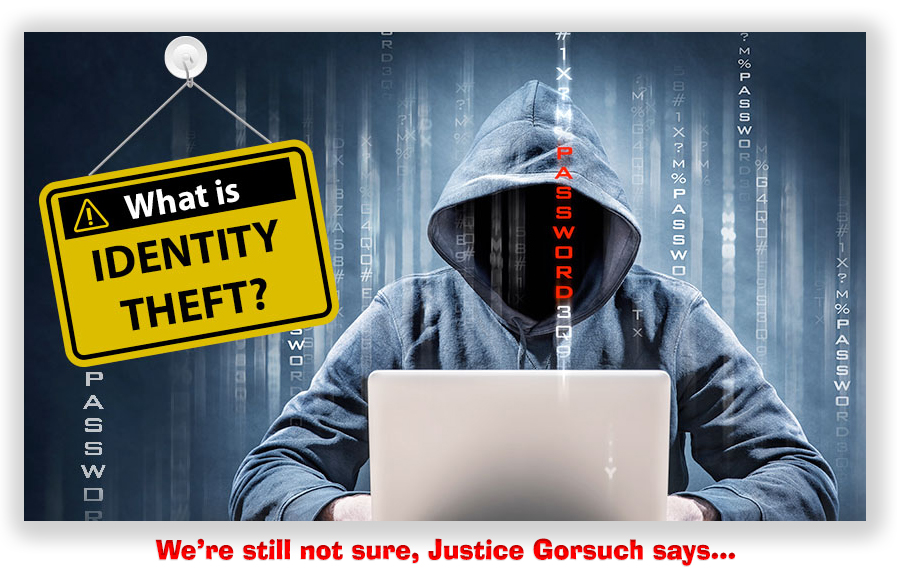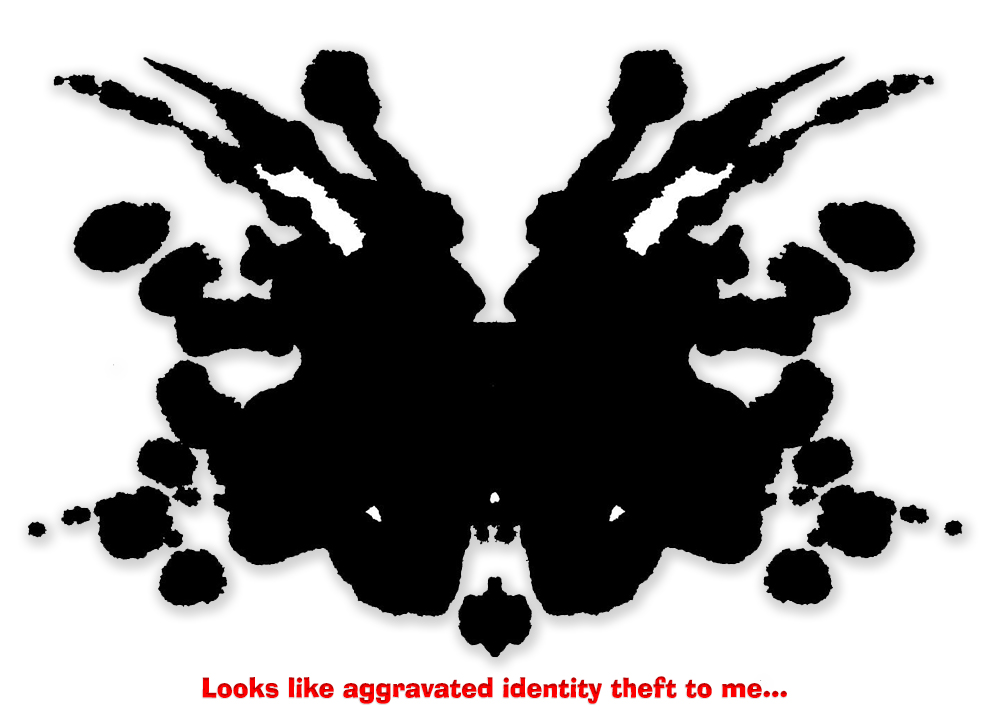We post news and comment on federal criminal justice issues, focused primarily on trial and post-conviction matters, legislative initiatives, and sentencing issues.

IDENTITY THEFT TAKES A ‘ROAD TRIP’
 The Supreme Court yesterday unanimously but unclearly narrowed the circumstances when aggravated identity theft under 18 USC § 1028A can be included as part of federal criminal charges, with Justice Gorsuch grousing in a concurrence that “criminal statutes are not games to be played in the car on a cross-country road trip. To satisfy the constitutional minimum of due process, they must at least provide ordinary people with fair notice of the conduct they punish…”
The Supreme Court yesterday unanimously but unclearly narrowed the circumstances when aggravated identity theft under 18 USC § 1028A can be included as part of federal criminal charges, with Justice Gorsuch grousing in a concurrence that “criminal statutes are not games to be played in the car on a cross-country road trip. To satisfy the constitutional minimum of due process, they must at least provide ordinary people with fair notice of the conduct they punish…”
Dr. David Dubin was convicted of healthcare fraud under 18 USC § 1347 after he overbilled Medicaid for psychological testing performed by the company he managed. The Doc would overstate the qualifications of the employee who actually performed the testing, sort of like having a patient get a shot from a nurse and then claiming a doctor performed the jab. Dave’s falsehood inflated the amount of reimbursement by a princely $338.00.
Dave was also convicted of aggravated identity theft under § 1028A(a)(1), because when he submitted the false claim to Medicaid, the claim included the name and numeric identifier of the patient. Section 1028A(a)(1) applies when “during and in relation to” certain offenses – including healthcare fraud – a defendant “knowingly transfers, possesses, or uses, without lawful authority, a means of identification of another person.”
The Government told SCOTUS that § 1028A(a)(1) was automatically satisfied because Dave’s fraudulent Medicaid billing included the patient’s Medicaid reimbursement number — a “means of identification.”
 Writing for the 9-0 Court, Justice Sotomayor rejected the government’s “sweeping reading, as long as a billing or payment method employs another person’s name or other identifying information, that is enough.” She observed that by that metric, “a lawyer who rounds up her hours from 2.9 to 3 and bills her client electronically has committed aggravated identity theft. The same is true of a waiter who serves flank steak but charges for filet mignon using an electronic payment method.”
Writing for the 9-0 Court, Justice Sotomayor rejected the government’s “sweeping reading, as long as a billing or payment method employs another person’s name or other identifying information, that is enough.” She observed that by that metric, “a lawyer who rounds up her hours from 2.9 to 3 and bills her client electronically has committed aggravated identity theft. The same is true of a waiter who serves flank steak but charges for filet mignon using an electronic payment method.”
The “staggering breadth” of the Government’s reading – under which everyday overbilling cases would account for the majority of violations – “underscores the implausibility of the Government’s interpretation,” the Court ruled. “While the Government represents that prosecutors will act responsibly in charging defendants under its sweeping reading, this Court cannot construe a criminal statute on the assumption that the Government will use it responsibly.”
The Court held instead that under § 1028A(a)(1), a defendant “uses” another person’s means of identification “in relation to” a predicate offense only when the use is “at the crux of what makes the conduct criminal… A far more sensible conclusion from the statutory structure is that § 1028A(a)(1)’s enhancement targets situations where the means of identification itself is at the crux of the underlying criminality, not just an ancillary billing feature.”
The decision did not go far enough to satisfy Justice Gorsuch, who argued in a concurrence that § 1028A was unconstitutional,
not much better than a Rorschach test. Depending on how you squint your eyes, you can stretch (or shrink) its meaning to convict (or exonerate) just about anyone… We have a term for laws like that. We call them vague. And in our constitutional order, a vague law is no law at all.
 The Dubin ruling is important because the ID theft law adds a two-year mandatory prison sentence onto underlying offenses that do not impose a mandatory prison sentence of any kind. Sentencing judges may not consider the severity of the offense, even if the amount of money involved is quite small or there are other mitigating factors.
The Dubin ruling is important because the ID theft law adds a two-year mandatory prison sentence onto underlying offenses that do not impose a mandatory prison sentence of any kind. Sentencing judges may not consider the severity of the offense, even if the amount of money involved is quite small or there are other mitigating factors.
The impact on people currently serving time for violations of 18 USC § 1028A is unclear but likely to be positive. For those beyond the deadline to file post-conviction motions under 28 USC § 2255, the traditional 28 USC § 2241 petition for habeas corpus will likely be available under the § 2255(e) saving clause. The extent of that remedy will be further defined in Jones v. Hendrix, Case No. 21-857, due to be decided by the Supreme Court in the next three weeks.
Because the Dubin decision is a statutory interpretation and not a constitutional holding (despite Justice Gorsuch’s persuasive argument that it could easily have been), the route of filing a second or successive § 2255 motion (under the rules set up by § 2255(h)) is probably unavailable.
Dubin v. United States, Case No. 22-10, 599 U.S. —, — S.Ct. —, — L.Ed.2d —, 2023 U.S. LEXIS 2420 (June 8, 2023)
New York Times, Supreme Court Narrows the Reach of an Aggravated Identity Theft Law (June 8, 2023)
– Thomas L. Root

